An Introduction
|
It is rare that a person has such a consistent personality that everyone you ask
about him unanimously has the same compliments to pay. Such is the case with Paul Gerber.
Ever since I first saw the Fortis chronograph alarm, several years ago, I was
curious about Mr. Gerber. A world first in combining a mechanical chronograph and a mechanical
alarm, the Fortis was considered a mechanical breakthrough in a wristwatch form factor.
Who was the watchmaker behind this mechanical marvel?
When I asked around, I consistently heard the same reply -
"Great watchmaker."
"A master of miniaturization."
"Very nice guy, very soft-spoken and very down to earth."
What is surprising is that in the directness and candor of his replies to my questions,
Mr. Gerber comes across exactly as billed in his reputation. How refreshing!
In fact, Mr. Gerber has been the genius behind the scenes on many projects for quite
some time, and it was just in the English language that his work has not been more widely publicized a
nd recognized.
I hope you find the following interview informative and interesting.
Sincerely,
TM
|
|
 |
 |
The Interview
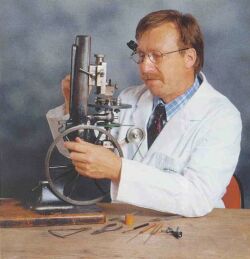 |
TP178: Mr. Gerber, what started your interest in
watches and watch making? What schooling or training have you received in the area of watch making?
Apprenticeships?
PG: Since a very young age I have always had an
interest in mechanical things, especially watches and the way they work. I entered a watch-making
apprenticeship at age 16.
At age 20 I began working for shops doing watch repair work. Eventually I opened
my own shop in Zurich, which after about 17 years I sold because I wanted to concentrate on watchmaking.
TP178: What other interests or passions do you have?
PG: I very much enjoy biking, fishing and model
airplanes.
TP178: What is your favorite watch? Your daily wear?
PG: My favorite watch is the complicated piece I have
been working on. It just fascinates me.
|
 |
 |
Bilanz
My daily wear is a yellow gold Retro Twin.
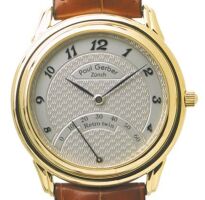 |
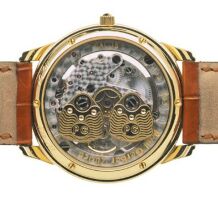 |
|
TP178: To what extent are the design aesthetics and the
quality of finishing important relative to the mechanical ingenuity of the movement, in your opinion?
PG: A watch does not necessarily work better with a high
degree of finish, but I think a watch without any aesthetic finish is simply an instrument to tell time.
For me, the aesthetics, quality and finish are important because I feel this is what gives a watch its
soul. I truly believe one can feel when a watch is "alive".
TP178: Please give us an overview of your current signed
model line.
Is there a brand philosophy or motif that is consistent in all of your standard production models?
PG: There is no brand philosophy or motif with my collection.
Each watch I create is different.
TP178: What makes Paul Gerber signed pieces unique, what
is their essence?
PG: I try hard to do something new, something that has not
been done before. For example, the Retro Grade flyback and the twin rotors on the Retro Twin were both
new creations.
|
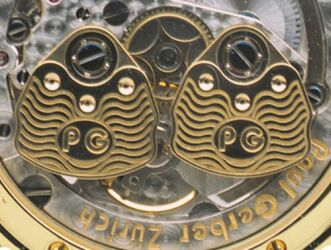 |
TP178: How do you see the future of your signed line and the AHCI?
What do you see as the role of the AHCI in today's horological environment ?
PG: We are a small group of around 16-17 people. I'm very happy with
our group. I think the role for us is to support each other in our endeavor to stay independent.
TP178: Do you have any desires to expand and develop the Paul Gerber
signed, currently limited, line of watches to any extent or do your main interests continue to lie in working behind
the scenes for more established watch manufactures?
PG: Today I have two models in my collection. I'm a very small producer
and don't see myself as ever having 10-15 models in my line. For example, I will continue to produce the Retro Grad
for about one more year and Retro Twin for a couple more years. I may offer one of these models with a variation in
the near future. In two years time I hope to have two new watches in my collection and so on. I won't stop making one
model for a couple of years and then decide to bring it back a couple of years later.
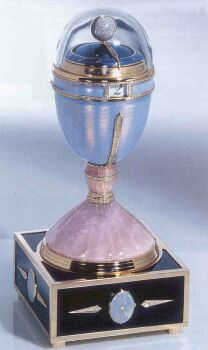 |
As for working behind the scenes for other manufactures, I have so much work myself and
time becomes a real problem for me. I will not be doing so much outside work in the future. However, I
will continue to take on special projects from time to time like the Faberge Egg timepiece I worked on
last year.
TP178: What do you feel about high tech in the world of
high mech? Different materials, different fab methods? and where do you see things heading in the future
for mechanical watches as a mechanical design exercise?
PG: I see a lot of exciting things going on in the watch
making industry. For example, Ulysse Nardin has some wonderful complications.
The aid of computers and better materials are a very big help. For myself, I find the
combination of old methods of craftsmanship and the benefit of new techniques a great asset to me. But
there will never be a substitute for hands-on craftsmanship.
|
 |
 |
TP178: You are often referred to as "Master of Miniaturization"
– How do you feel about this title?
PG: Yes, I have heard this one before. It makes me smile! However,
I would never want to have a title of being the "greatest" or something like this. To me this would mean I
know everything and I surely don't. There are many wonderful watchmakers in the industry and I love learning something
new every day.
TP178: The issue of continuity and service into the future is one that
concerns the consumer. The big question is what is going to happen once you retire? Should the AHCI members all merge
into one big company, or sooner or later are you going to have to sell to a bigger group (ie: Swatch, Vendome...)
PG: I don't think I will ever retire. At this time watch making is my
living, my profession. I may slow down a little later on and instead of producing 50 watches per year, I may only make
around 20 watches per year.
I don't think that the AHCI members will merge into one big company. I think we should all stay
independent but help each other where we can.
TP178: What major brand, if any, do you respect or admire?
PG: I have to say Patek Philippe. They are a very stable company and
always continue to be innovative and do interesting work.
TP178: Are there any watch industry executives or personalities that you
respect or admire?
PG: George Daniels. I admire his work ethic and ability to create. He's
also been a great friend.
TP178: What position in the Haute Luxe market segment to you see Paul
Gerber products now? In the future?
PG: I see my products as being for the collectors, not really in any
specific market segment. I think the same for the future.
TP178: Turning now to a few practical business realities - Do you see
the Swatch Group's plans to further restrict the supply of ebauche from F. Piguet and Nouvelle Lemania as posing a
problem for independent watchmakers such as yourself? For other brands that depend on such ebauche?
PG: I don't think this is healthy for the industry overall. It's hard
to be independent. Its good that we can use ebauches for watches we produce.
Being independent for me also means I am able to make everything I may need. This takes more time and makes the product
more expensive in the end.
TP178: Any thoughts regarding the distribution channels? Traditional?
future?
PG: Again, since my company is small, I'm very happy with my traditional
distribution network.
TP178: Returning to a bit more abstraction and philosophy, what does high
horology mean to you? Is it purely a mechanical engineering exercise, or is there something more? How important is
tradition and heritage in a fine timepiece?
PG: I think high horology means a combination of all the above. Engineering
is important. Tradition I feel is something that reflects in the end result.
TP178: What is your vision of watch making? Few pieces of very high
craftsmanship but reserved for only an elite who can afford them, or more "mass" production and affordable
pieces ?
PG: Both. Sure I
wish everyone could own one of my watches. Mass production
is not possible for me so it is not possible for everyone to own
one of my watches. I don't think I make watches with the
idea that they are only for the elite. Unfortunately, I can only
produce so many watches.
TP178: Is it possible to share, to nurture, an appreciation of haute
luxe via the virtual medium of the internet?
PG: I think the Internet is a great resource for information.
TP178: Do you personally surf the net? What sort of sites do you visit?
PG: I do visit ThePuristS.com often. I very much enjoy reading
about trends and what people are sharing about watches. It's hard for me because my English is not the best
but I can understand most of what collectors are saying.
I also enjoy visiting E-bay. You can find almost anything on this site.
TP178: Thank you, Mr. Gerber, for your time and sincerity. In conclusion,
is there any specific message you would like to communicate to high-mech watch and haute horlogerie fans?
PG: I hope that all of you will continue to enjoy mechanical watches
and watch collecting.
I feel very honored that you invited me to do this interview. I would like to extend an invitation to all
of you to visit my workshop if you are ever in Zurich.
Editor's notes: I would like to extend special thanks to Mr. Michel Schmutz for his assistance in
putting together this interview. Mr. Schmutz and his company, Intro-Swiss, is the US agent and distributor for Paul
Gerber watches.
I would also like to note that Mr. Bill Stonehill, a regular participant here at ThePuristS.com,
is the Paul Gerber agent and distributor for Japan, through his company, Ishioka Shokai Ltd.
TM
Go to ThePuristS.com Home Page or
The AHCI Forum
We welcome comments, suggestions, and corrections to this article.